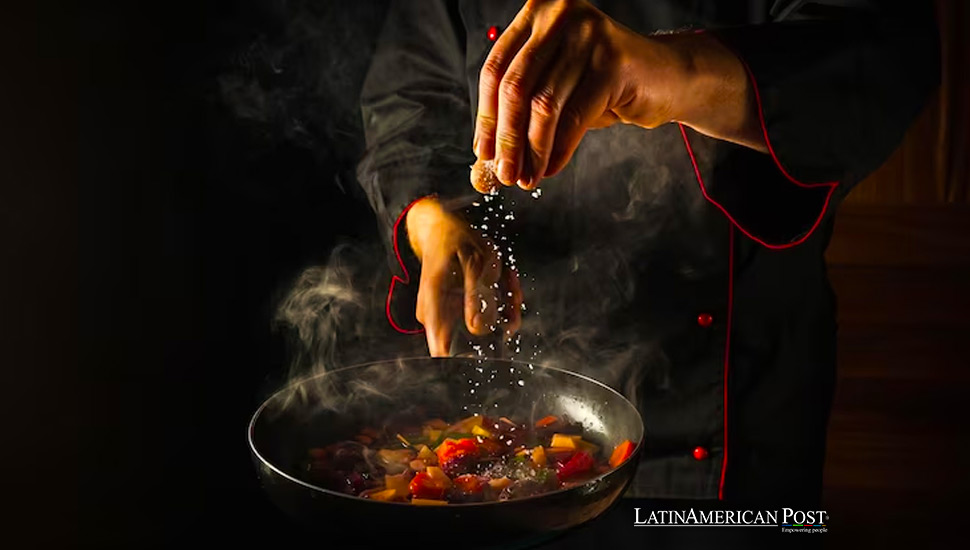Dominican Gastronomy: Crafting Global Respect Through Local Flavors

The Dominican Republic’s culinary scene, celebrated for its vibrant flavors and traditions, is poised for global recognition through innovative local ingredients, a fusion of traditional dishes with modern techniques, and a commitment to sustainable practices, as discussed in the tenth Dominican Gastronomic Forum.
Embracing Culinary Diversity
In the heart of the Caribbean, the Dominican Republic’s culinary landscape is a vibrant tapestry of flavors, ingredients, and traditions, reflecting the island’s rich history and diverse cultural influences. At the tenth Dominican Gastronomic Forum, chefs and culinary experts gathered to discuss the future of Dominican cuisine, emphasizing innovation, tradition, and sustainability as key to achieving international acclaim.
The forum, organized by the Fundación Sabores Dominicanos, became a melting pot of ideas and visions for the culinary future of the nation. Dominican chef María Marte, a two-time Michelin star recipient, shared her insights, underscoring the potential for Dominican cuisine to make its mark on the global stage. Marte’s success at Club Allard in Madrid is a beacon for Dominican culinary excellence and innovation.
Central to the forum’s discussions was the idea that Dominican gastronomy can gain international respect by embracing local ingredients and blending traditional dishes with modern culinary techniques. This approach honors the country’s gastronomic heritage and propels it into the future, showcasing the Dominican Republic’s ability to innovate within its rich culinary tradition.
The influence of oriental flavors and techniques on Dominican cuisine was highlighted as a testament to the country’s culinary diversity and richness. This fusion is seen as an integral part of the culinary evolution in the Dominican Republic, contributing to a unique gastronomic identity that is both traditional and contemporary.
To elevate Dominican cuisine on the world stage, experts at the forum stressed the importance of balancing nutrition with culinary tradition. This involves promoting healthy eating habits while maintaining Dominican food’s distinctive flavors and identity. The concept of sustainable national gastronomy was also emphasized, underscoring the need for practices that ensure a prosperous and equitable future for all stakeholders in the food chain.
Pursuit of Excellence
Marte pointed out the rise of high-quality culinary establishments in the Dominican Republic, showcasing regional flavors and fresh ingredients. She expressed optimism that a Michelin star for a Dominican restaurant is within reach, a milestone that would underscore the country’s culinary prowess.
After years abroad, Marte returned to the Dominican Republic to promote culinary education for young women from underprivileged backgrounds and to preserve indigenous edible plants from extinction. Her work exemplifies the potential of culinary arts to drive social change and conservation.
Argentinian marketing expert Juan Dean highlighted the significance of offering unique culinary experiences to promote Dominican gastronomy. He noted that creating new employment opportunities, promoting national culture and identity, and fostering sustainability and local commerce are crucial for enhancing the country’s culinary reputation.
Dean emphasized that showcasing a wide array of authentic local dishes is appealing in today’s market, where many tourists select destinations based on culinary reputation. This trend presents an opportunity for the Dominican Republic to attract gastronomy enthusiasts worldwide.
The Dominican Gastronomic Forum’s discussions reflect a broader trend in Latin American cuisine, where countries are increasingly seeking to balance tradition with innovation to carve out a space on the global culinary map. From Mexico’s rich mole sauces to Peru’s acclaimed ceviche, Latin American countries are turning to their culinary heritage as a source of national pride and international recognition.
In this context, the Dominican Republic’s culinary scene is not an isolated phenomenon but a more significant movement across Latin America to elevate traditional cuisine to global standards. By focusing on local ingredients, sustainable practices, and innovative culinary techniques, Latin American countries are redefining their gastronomic identities and challenging the global culinary hierarchy.
A Culinary Movement in Latin America
The Dominican Republic is at the forefront of this culinary renaissance with its array of flavors ranging from the hearty sancocho to the sweet and creamy tres leches. The nation’s food tells the story of its history, from Taino origins to Spanish colonization and African influences, creating a gastronomic legacy that is both diverse and unique.
As the Dominican Republic continues to innovate within its culinary tradition, it enhances its gastronomic profile and contributes to the broader narrative of Latin American cuisine on the world stage. The discussions and initiatives emerging from the Dominican Gastronomic Forum signify a promising future for the country’s culinary scene, one that respects its roots while embracing the possibilities of the global market.
Also read: New Maritime Link Boosts Puerto Rico and Dominican Republic Connectivity
The Dominican Republic’s journey towards international culinary recognition symbolizes the broader aspirations of Latin American gastronomy. Through a commitment to innovation, tradition, and sustainability, the region’s culinary heritage is being reimagined and celebrated, offering a feast of flavors that invites the world to the Latin American table. As chefs like María Marte lead the charge, the Dominican Republic’s culinary scene stands on the cusp of global acclaim, ready to share its unique gastronomic story.





